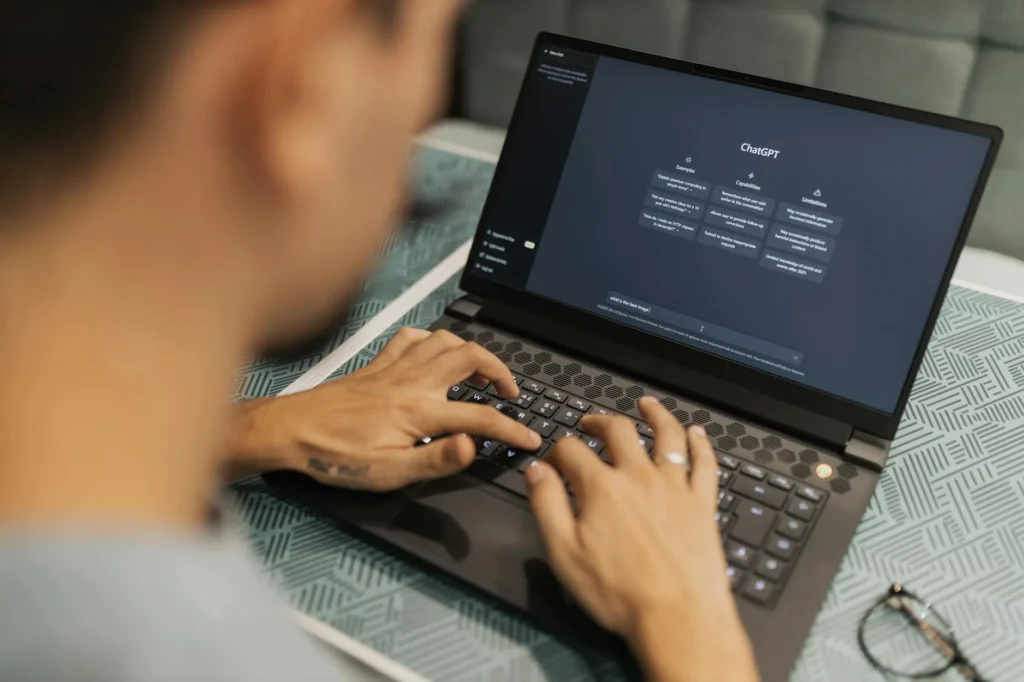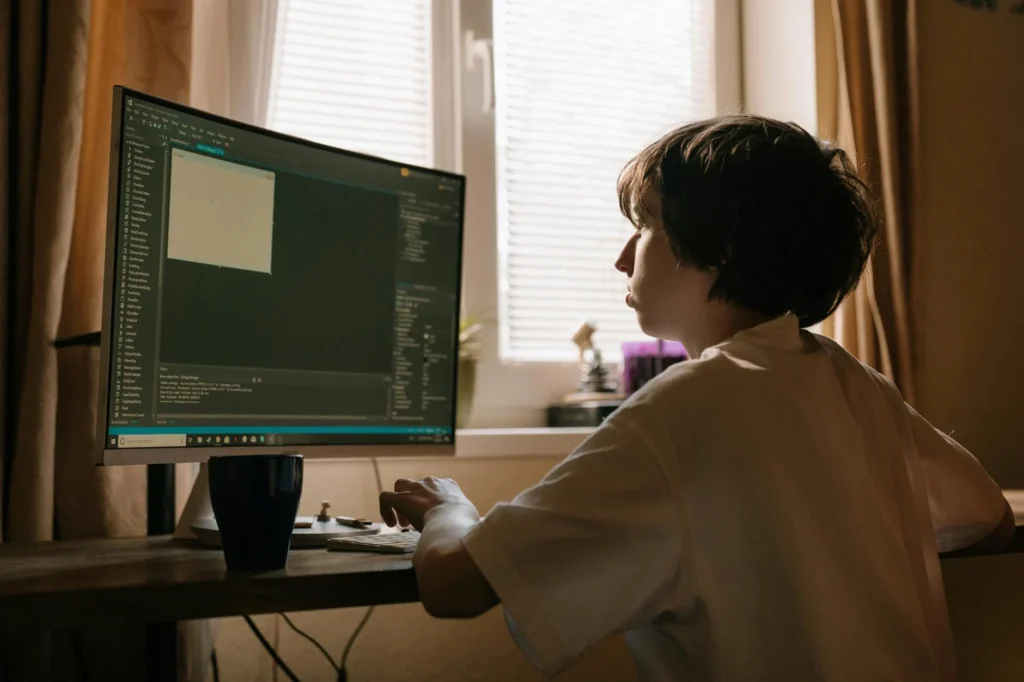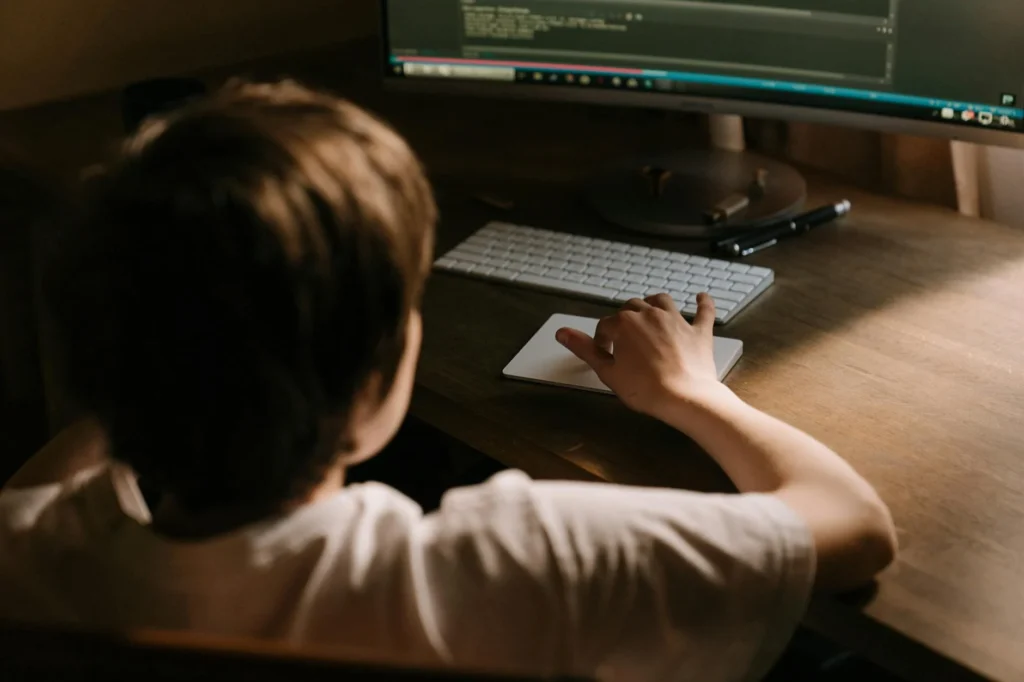
We offer a comprehensive curriculum developed by an international team, experienced teachers, and a focus on individualized and project-based learning.

We offer a comprehensive curriculum developed by an international team, experienced teachers, and a focus on individualized and project-based learning.

Coding isn’t just a technical skill—it’s a way of thinking. It helps you solve problems, think creatively, and make better decisions.
Starting young has big perks, like building confidence and learning programming concepts early.
Whether you’re interested in web development, data science, or game development, coding unlocks opportunities. Beginners can try online courses, interactive tutorials, or small projects to get started.

Learning to code isn’t just a skill—it’s a smart move for the future. Technology touches everything, and coding opens doors to new opportunities, creative projects, and real-world problem-solving. Start now, and you’ll gain valuable skills that will keep paying off.
Coding is often called the “new literacy” because it’s becoming a key skill in today’s world. It’s not just about building websites or apps—it helps you understand and control technology, instead of just using it.
Programming skills are also in demand across fields like marketing, finance, and education. Knowing languages like Python or understanding data structures can help you analyze trends, manage data, or automate tasks. Imagine saving hours by automating reports or creating tools that simplify workflows—these skills set you apart.
Coding also connects creativity with problem-solving. Learning tools like HTML, CSS, or JavaScript lets you bring ideas to life, from simple websites to full platforms. Just like writing lets you share thoughts and influence others, coding opens up new ways to create and innovate.
Coding isn’t reserved for professionals—it’s a fantastic tool for fostering creativity and honing problem-solving skills at any stage of life. When you learn coding, you naturally develop logical thinking and the ability to break down complex projects into manageable tasks. This process mirrors how a chef creates a dish, starting with basic building blocks like ingredients and techniques to create something extraordinary.
For instance, coding challenges like developing a game or tackling a real-time coding project require both discipline and imagination. You’ll often need to test different solutions, troubleshoot errors, and refine your approach. This teaches you resilience and a growth mindset—essential traits that carry over into other areas of life. Writing efficient code or tackling data science projects demands innovative thinking and precision, allowing you to craft unique solutions while learning how to spot patterns and make connections.
Creativity also flourishes as you explore different programming languages and experiment with interactive tools. Whether you’re designing visuals for a mobile app or automating repetitive tasks in a spreadsheet, coding offers endless ways to bring your ideas to life. The beauty of programming lies in its flexibility—there’s no single solution to a problem, so you’re always encouraged to think outside the box.

One of the most tangible benefits of learning to code is the wide range of career opportunities it opens up. Coding skills are no longer confined to roles in software development technology—they’re relevant across sectors. Here are just a few examples of careers where programming knowledge proves invaluable:
Beyond these specialized fields, many non-technical job postings now value basic coding literacy. Understanding data types, writing Python code, or creating prototypes can make you a stronger candidate for roles in project management, digital marketing, and even HR tech. Employers recognize that someone who knows how to start coding is better equipped to embrace and implement innovative solutions.
As technology grows increasingly integrated into daily life, coding is a skill set that stays relevant. Whether you’re tackling more complex challenges in software development or using coding projects to streamline your workflow, these abilities ensure you’re adaptable, competitive, and ready for the future job market.
Starting to learn coding at a young age provides unique benefits that extend far beyond the ability to write code. Whether it’s about developing essential life skills or setting children up for academic and career success, early exposure to coding creates a strong foundation for problem solving, creativity, and logical reasoning. Here are a few key reasons why the earlier someone starts their programming journey, the better.
When children start coding early, they naturally learn computational thinking—a skill that helps break down complex problems into smaller, digestible steps. Think of it like solving a giant puzzle: identifying the edges first before connecting the middle pieces. This process doesn’t just apply to computer programming; it’s a universal approach to problem solving in everyday life.
Coding builds structured thinking and problem-solving skills. Kids learn to debug, spot patterns, and manage tasks step-by-step. These habits help them tackle challenges, understand cause and effect, and stay curious instead of frustrated. For example, debugging code teaches them to find errors, just like solving math problems or editing essays.
This mindset fosters independence and creativity. Kids can start with simple programming concepts like loops or conditions, and over time, they’ll use these blocks to create innovative and complex projects like games or interactive stories. Naturally, this also improves how they tackle real-world problems, making computational thinking a skill they can rely on in multiple areas of life.

One of the most empowering aspects of learning to code is the sense of accomplishment that comes with creating something from scratch. For kids, completing their first basic website, a simple animation using HTML and CSS, or even a game in their preferred programming language can be a transformative experience.
These small projects become stepping stones toward tackling more complex tasks, and they play a huge role in building confidence. Think about the boost a child feels when they press “run” and see a line of code come alive as an animation or light on the screen. That instant feedback creates excitement and reassurance that their efforts pay off.
Small wins in coding also encourage persistence. Kids quickly learn that mistakes, such as a missing semi-colon in their code, are part of the learning process. Learning to debug doesn’t just teach patience—it reinforces the idea that problems can be solved with determination and focus. Overcoming coding challenges instills the belief that they are capable of solving bigger problems too, both in computer programming and in life.
Parents and educators can support this journey by choosing age-appropriate coding basics. Tools like drag-and-drop coding platforms or guided video tutorials make the learning process less daunting for beginners. The joy of solving one tiny puzzle at a time builds momentum, turning coding for beginners into a lifelong passion.
Learning programming early boosts skills in math and logic. Concepts like sequencing, loops, and data structures connect directly to problem-solving and reasoning. Coding projects teach kids to break problems into smaller steps, much like solving multi-step math problems.
For example, creating a game or exploring data science with Python uses numbers, functions, and rules. These activities sharpen skills like estimation, pattern recognition, and algebraic thinking. Kids who code often do better in STEM subjects because they practice these abilities regularly.
Coding also builds teamwork. Many projects involve working with others to create apps or solve problems together. This helps kids learn communication, responsibility, and how to value different ideas. These skills carry over to group work and presentations in other classes.
Coding isn’t just about computers. It trains kids to think logically, solve problems, and approach challenges creatively. These skills help with schoolwork, science projects, and even finding solutions in everyday life.

Jumping into coding might seem like a big step, but starting is simpler than you think. Whether you’re a student, parent, or teacher, the possibilities in coding grow with your curiosity. Coding empowers you to solve problems, create innovative tools, and understand how the digital world functions. Here’s everything you need to make your first step a confident one.
The tools and platforms you start with can make a big difference in how easily you pick up coding. Fortunately, there are several beginner-friendly options designed to make learning enjoyable and structured, regardless of your age or experience.
Your choice of tools might depend on your goals—are you learning for school, for fun, or for a future career? For kids or absolute beginners, visual platforms like Scratch reduce overwhelm. For career-oriented learners exploring in-demand coding skills, starting with Python or HTML, CSS, and JavaScript is an excellent choice.
When you’re learning something new, the best way to stay motivated is by building tangible projects. Coding beginners often see progress faster when working on hands-on projects that they can interact with or showcase. Start small and challenge yourself gradually.
Here are a few beginner-friendly projects to try:
As you complete these, remember: it’s not about perfection; it’s about exploring and understanding coding concepts. Each project brings its challenges, but overcoming them teaches you problem-solving skills and builds confidence. Plus, by tackling manageable goals, you’ll build momentum for more complex projects in the future, such as developing a simple mobile app.

One of the best ways to learn to code—especially for younger learners—is through gamified experiences. Think of it like leveling up in a video game: you learn new concepts, practice skills, and overcome challenges to move on to the next stage.
Here’s how to make the learning process playful:
Experimentation is key. By trying new tools or revisiting old projects to add features, you’ll refine skills and gain a deeper understanding of programming concepts. Remember, even experienced programmers make mistakes—it’s how you learn. Through play, you’ll turn mistakes into valuable lessons, reinforcing what you’ve learned along the way.
Jumping into coding can feel like solving a puzzle: each wrong turn is just part of finding the correct solution. Make coding fun, accessible, and engaging as you start your coding journey.
Many are hesitant to start coding because of preconceived notions about who can or should learn it. The good news is that coding is more approachable than you might imagine—it’s not confined to tech-savvy geniuses or limited by age. Let’s break these misconceptions down and uncover what makes coding an accessible skill for everyone.
It’s easy to think coding is only for math prodigies or computer science graduates, but that’s far from true. At its core, coding is about solving problems step by step, and most programming languages are designed with simplicity in mind. Whether you’re creating a basic website with HTML, CSS, and JavaScript or tinkering with Python to automate tasks, coding is more about logical thinking than memorizing endless rules.
Think of coding like learning to cook. At first, you might feel overwhelmed by unfamiliar tools and terms, but once you master basic recipes, you can build on your skills. The same applies to coding. Simple concepts like loops or conditions serve as the building blocks for more complex tasks, and platforms like Scratch or Code.org make these concepts fun and interactive for beginners.
Online platforms and free courses have made learning accessible to everyone, whether you’re a high school student or someone looking to write code for personal projects. Coding for beginners has evolved to prioritize engagement and ease. So, if you’re wondering how to start coding, know that anyone can dive in with the right resources.
You’re never too young or too old to learn how to code. These days, children as young as six start learning the basics through playful apps like Tynker or Minecraft Education Edition. Conversely, adults transitioning into software development or other tech-related fields at 30, 40, or even 50 are becoming increasingly common.
Success stories abound—for instance, Mark, a middle-schooler from the Philippines, built his first mobile app using drag-and-drop coding tools. On the other hand, Sarah, a 45-year-old former librarian, landed her first software engineering job after teaching herself Python and learning data structures through free online courses.
Learning is flexible. Kids might enjoy game development, while adults often tackle real-world challenges like automating tasks. Whether you’re making animations or apps, pick a language that fits your goals. Age doesn’t matter—your drive to learn does.
Let’s face it: the idea of failing can be daunting, especially when a single coding error can break an entire project. But coding is one of the best ways to learn resilience. Even experienced programmers frequently encounter bugs and mistakes—it’s all part of the journey.
Think of debugging as problem-solving in action. That missing semi-colon or improperly nested loop isn’t a sign of failure; it’s an opportunity to refine your skills. Start with small coding projects to build confidence, such as creating a simple game, animation, or basic website. Each success, no matter how minor, reinforces your ability to overcome challenges.
Here’s how you can ease the fear of failure and build a growth mindset:
The key is recognizing that failure is a teacher, not an endpoint. By practicing coding with persistence and patience, you’ll develop the problem-solving skills to tackle increasingly complex challenges—both in programming and in life.

Coding isn’t a one-and-done skill; it requires consistent effort and adaptability to stay relevant in a rapidly evolving field. Whether you’re mastering new programming languages or refining your existing coding skills, maintaining them involves a mix of continuous learning, practical application, and active community engagement. Let’s explore how you can adapt and sharpen your programming journey as the industry evolves.
Keeping up with the latest trends in coding can feel like running to keep pace with a fast-moving train. New programming languages, frameworks, and technologies emerge constantly, but staying current is easier when you have a strategy. Here are some tried-and-tested ways to stay updated:
Staying current doesn’t mean learning everything—focus on the programming concepts or tools most relevant to your goals. By dedicating even an hour a week to exploring trends, you’ll ensure your skills remain marketable.
Theory alone won’t make your skills flourish—you need practical experience. Coding for real-world problems strengthens your foundational knowledge while pushing you to think creatively. Tackling coding challenges doesn’t have to be daunting; many scenarios in daily life can inspire useful projects.
Here are some ideas to get started:
Practical projects make abstract programming languages feel relevant and tangible. They also make your portfolio shine, which can boost your appeal to job postings or even attract collaborative opportunities in online communities.
Engaging with others in the coding community transforms a solo journey into an enriching collaborative experience. Growing your network introduces you to new ideas, tools, and expertise while fostering a sense of camaraderie.
Make the most of community-driven events:
These events are not just about learning programming concepts; they also offer mentorship, motivate learning, and introduce perspectives you may not have considered. Whether you’re a beginner starting your coding journey or an experienced professional mastering complex tasks, community interactions challenge and inspire growth.

Once you’ve mastered the basics, it’s natural to wonder how to move beyond beginner-level coding. The key is to build on what you know while gradually introducing more advanced concepts. This doesn’t mean taking on overwhelming projects right away—it’s about pacing yourself and making consistent progress. Here’s how to move forward:
Even as you start learning new skills, it’s essential to revisit and strengthen the basics. Many intermediate coding challenges require a solid grasp of fundamentals like loops, functions, and data structures. A deeper understanding will make it easier to tackle more complex projects.
Begin applying your skills to slightly more complex projects that challenge your thinking. This is where you can explore combining concepts and experimenting with logic.
Here are a few ideas:
Once you’ve gained confidence with your first language, add another to your toolkit. Each language has strengths suited to certain tasks, and learning a second language can deepen your understanding of coding principles.
Here are a few options to consider:
Focus on a language that aligns with your goals. For example, if you want to explore data science, Python is a great choice. If you’re interested in game development, C# might be more practical.

Problem-solving is one of the core strengths of a good programmer. Developing this skill is just as important as learning to code. Platforms like HackerRank, LeetCode, and Codewars provide coding challenges of varying difficulty levels. Start with beginner or intermediate problems, and work your way up as you gain confidence.
Here’s how you can practice effectively:
If you’re coding with the goal of finding a job or freelance work, start building a portfolio of your projects. Your portfolio is your chance to showcase your skills, creativity, and problem-solving ability. Include a mix of small and large projects, and make sure they demonstrate your range as a programmer.
Some tips for a standout portfolio:
Intermediate coding is also about writing better, more efficient code. As you advance, learn and apply these principles:
Many of these skills are best learned by studying others’ code and contributing to open-source projects. Look at well-written code to see how experienced developers approach problems, organize their files, and structure their logic.
Consistency is the secret to growing as a coder. Set aside time each day or week to work on coding, whether it’s solving a small challenge, building a feature for a project, or exploring new tools. Keep your curiosity alive by asking “what if” questions. What if you combined two projects you worked on? What if you used a different approach to solve the same problem? Thinking like this can inspire new ideas and keep your learning journey interesting.
As you push into intermediate coding, remember to enjoy the process. Every mistake and bug is part of the learning process, and each solution you find makes you a better programmer. Keep building, experimenting, and solving problems—you’re on a great path forward.

Coding is a skill that grows with you, and the journey is unique for everyone. Whether you’re learning for a potential career, personal projects, or just for fun, it’s important to find a path that keeps you motivated while challenging you to improve. Here are some steps to help you stay focused and build momentum.
Before diving deeper into coding, think about what you want to achieve. Are you planning to become a software developer? Do you want to build your own app or website? Maybe you’re interested in automating tasks or exploring data analysis. Clear goals will guide your learning and help you choose the right tools and languages.
For example:
Adjust your goals as your interests grow. The more specific your goal, the easier it is to measure your progress.
Learning coding concepts is important, but practicing them creates lasting skills. Balance your time between studying and building. For example:
This mix of theory and practice helps cement what you’ve learned and makes each concept feel useful. You’ll also stay motivated as you see your projects evolve.
Don’t underestimate the power of sharing what you’re building. Show your work to friends, family, or online communities. You might get helpful feedback, ideas for new features, or even discover opportunities you didn’t expect.
For extra benefits:
Sharing your progress builds confidence. It also helps you explain coding concepts clearly, reinforcing your understanding.
Curiosity is one of the best qualities for learning to code. Try experimenting with unfamiliar tools, languages, or platforms. Explore different areas of programming until you find what clicks with you.
If you’re feeling stuck, mix things up:
Staying curious keeps coding fun and helps you uncover interests you might not have thought about.
Learning to code can be overwhelming if you don’t pace yourself. Take small breaks when you feel stuck or frustrated. Often, stepping away helps you refocus and approach problems with fresh eyes.
Also, celebrate your progress—no matter how small. Whether you debugged your first error, created a working program, or completed an online course, take a moment to acknowledge what you’ve achieved. These wins keep you motivated for the challenges ahead.
Consistency matters more than speed. It’s better to code for 30 minutes a day than for 5 hours once a week. A regular practice routine helps you retain what you’ve learned and makes progress feel manageable.
Tips for creating a routine:
Stick to a routine, but don’t worry if you miss a day. What matters is building a habit over time.
Whether you’re just starting or leveling up, coding is all about steady improvement. Try new things, celebrate every step forward, and remember: there’s no right or wrong pace. Keep building, learning, and solving problems—your skills will grow, and so will your confidence.

Learning to code isn’t just about mastering a technical skill. It’s a way to think creatively, solve problems, and open doors to new opportunities. Starting early helps build a strong base in critical thinking and innovation, but it’s never too late to begin. Coding improves logical thinking and adaptability, skills that benefit every area of life.
Begin your coding journey with small, manageable steps. Explore beginner-friendly platforms or try interactive tools. Start simple with Python or build a basic website using HTML, CSS, and JavaScript. Focus on projects that excite and motivate you to keep going.
Coding is a lifelong skill that stays relevant no matter your age or background. Take the first step today and see how it can reshape your future.
Book a demo to see how coding can transform your journey into one of innovation and endless opportunity!
Get all the latest information, support and guidance about the cost of living with kindergarten.
Start Registration